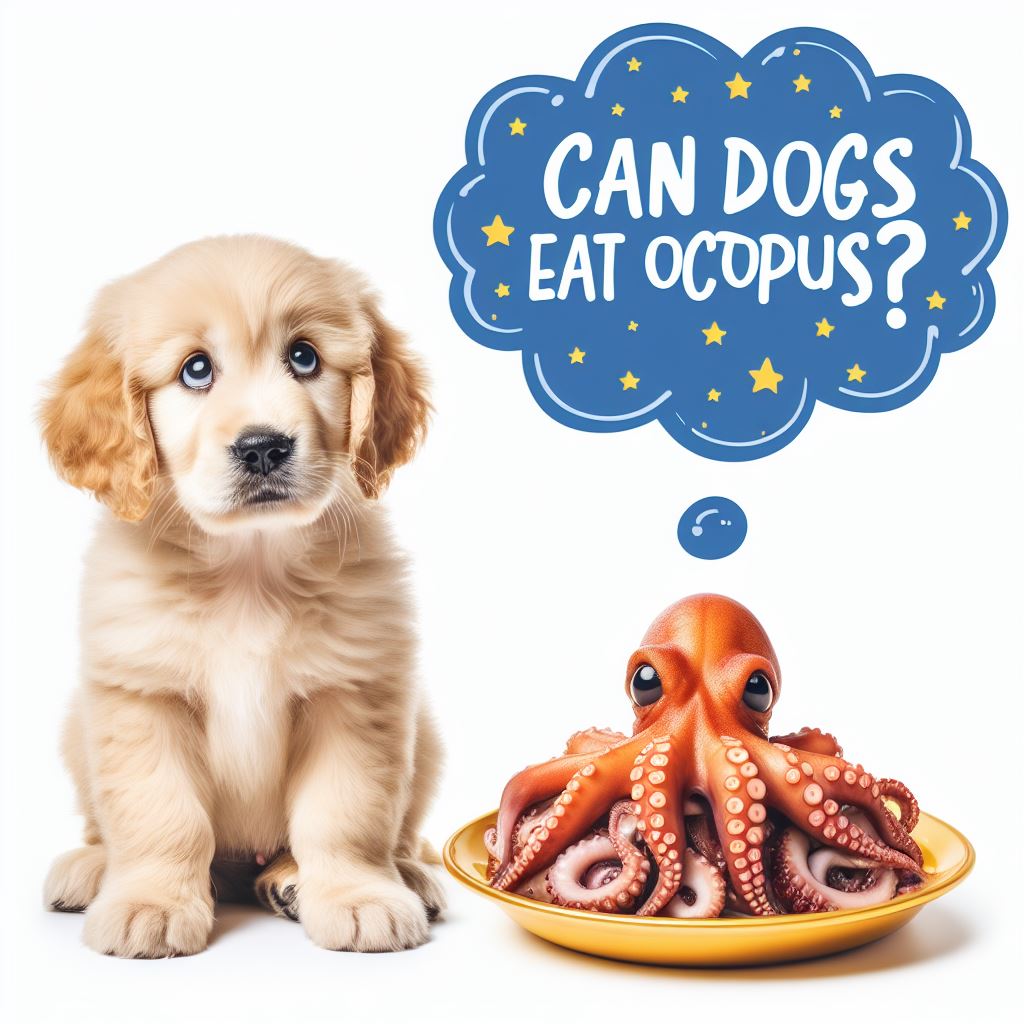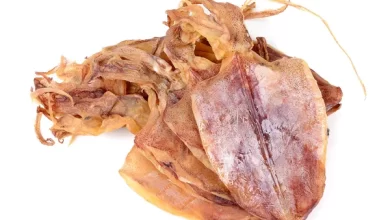Octopus-Dog Debate: Understanding If Dogs Can Eat Octopus-2024

Can dogs eat octopus is now a frequent question among the pet owners cause understanding the dietary needs of dogs is essential for maintaining their health and well-being. Dogs require a range of nutrients that play specific roles in their bodily functions, growth, and overall vitality. Essential nutrients include proteins, fats, carbohydrates, vitamins, minerals, and water.
A balanced diet ensures that dogs receive the appropriate amounts of all essential nutrients. This balance promotes healthy growth, maintains energy levels, supports the immune system, and prevents nutritional deficiencies. Proper nutrition helps puppies develop properly, maintains adult dogs’ health, provides the energy required for daily activities, helps dogs resist infections, and recovers from illnesses.
Proteins play a fundamental role in a dog’s diet. They are composed of amino acids necessary for building and repairing tissues, producing enzymes and hormones, and supporting the immune system. Sources of protein in a dog’s diet include animal-based proteins such as chicken, beef, lamb, and fish, which are highly digestible and provide all essential amino acids. Plant-based proteins such as soy, legumes, and certain grains can be included but often need to be combined with other protein sources to provide a complete amino acid profile.

Commercial dog foods are formulated to include a balanced mix of protein sources, ensuring dogs receive the necessary amino acids. By understanding and addressing these dietary considerations, dog owners can help ensure their pets lead healthy, active, and happy lives. Proper nutrition is the foundation of a dog’s overall health and well-being, making it essential to provide a diet that meets their specific nutritional needs.So let’s explore together that-Can Dogs Eat Octopus?
Nutritional Profile of Octopus
As pet owners increasingly seek alternative protein sources to diversify their dog’s diet, octopus has emerged as a potential option due to its nutritional profile and purported health benefits. Understanding the nutritional composition of octopus and its comparison to other common meats in dog food can provide valuable insights into its potential role in canine nutrition. Additionally, exploring the potential health benefits associated with including octopus in a dog’s diet can help pet owners make informed decisions about incorporating this seafood into their furry companion’s meals.
- Protein: Octopus is rich in protein, making it a valuable source of amino acids essential for muscle development, maintenance, and overall health.
- Fat: Octopus is relatively low in fat compared to other meats, making it a suitable option for dogs with weight management or dietary concerns.
- Vitamins and Minerals: Octopus contains essential vitamins and minerals, including vitamin B12, vitamin E, potassium, and phosphorus, which contribute to overall health and vitality.
- Omega-3 Fatty Acids: Octopus is a good source of omega-3 fatty acids, which support skin and coat health, reduce inflammation, and promote cardiovascular health in dogs.
Comparison of Octopus Protein Content to Other Common Meats in Dog Food:
- High Protein Content: Octopus typically contains a protein content ranging from 15% to 25% or more, depending on factors such as freshness and preparation method.
- Comparable to Chicken and Beef: The protein content of octopus is comparable to that of common meats used in commercial dog food, such as chicken and beef, making it a viable alternative protein source for dogs.
Potential Health Benefits Associated with Including Octopus in a Dog’s Diet:
- Muscle Development and Maintenance: The high-quality protein found in octopus supports muscle development and maintenance in dogs, making it particularly beneficial for active or growing dogs.
- Skin and Coat Health: The omega-3 fatty acids in octopus contribute to healthy skin and a shiny coat, reducing the risk of dryness, itching, and dullness in dogs.
- Joint Health: The presence of collagen and other nutrients in octopus may support joint health and mobility, potentially benefiting dogs prone to arthritis or joint-related issues.
- Nutritional Variety: Incorporating octopus into a dog’s diet provides nutritional variety and may help prevent dietary sensitivities or allergies associated with common protein sources like chicken or beef.
Octopus offers a nutrient-dense protein source with potential health benefits for dogs, including muscle development, skin and coat health, joint support, and dietary variety. While it may not be suitable for every dog, incorporating octopus into a balanced diet can provide valuable nutrients and contribute to overall health and well-being. As always, pet owners should consult with a veterinarian or animal nutritionist before making significant changes to their dog’s diet.
Digestive Compatibility
The digestive compatibility of food plays a crucial role in determining its suitability for inclusion in a dog’s diet. Understanding the canine digestive system and its ability to process different types of food, including proteins like octopus, is essential for ensuring optimal nutrient absorption and digestive health in dogs. Factors influencing the digestibility of proteins, research on the digestibility of octopus, and its impact on canine digestive health provide valuable insights into its potential role in canine nutrition.
Canine Digestive System and Processing of Different Foods:
- Digestive Anatomy: Dogs have a relatively short gastrointestinal tract compared to some other mammals, which influences the rate at which food is digested and absorbed.
- Role of Enzymes: Enzymes in the dog’s digestive system, such as proteases, lipases, and amylases, break down proteins, fats, and carbohydrates into smaller molecules for absorption.
- Dietary Fiber: Dogs require dietary fiber for gastrointestinal health and regularity, with fiber aiding in digestion and promoting the growth of beneficial gut bacteria.
Factors Influencing Protein Digestibility, Including Octopus, in a Dog’s Diet:
- Protein Source and Quality: The source and quality of protein influence its digestibility in dogs. High-quality proteins, such as those found in animal sources like octopus, are more easily digestible and provide essential amino acids necessary for canine health.
- Processing and Preparation: The method of processing and preparation can impact the digestibility of proteins. Cooking octopus thoroughly can break down protein molecules, making them more accessible for digestion and absorption in the dog’s gastrointestinal tract.
- Allergenic Potential: Some proteins may be more allergic to certain dogs, leading to adverse reactions or digestive issues. While octopus is not a common allergen for dogs, individual sensitivities can vary.
Research on the Digestibility of Octopus and its Impact on Canine Digestive Health:
- Limited Research: There is currently limited scientific research specifically examining the digestibility of octopus in dogs. However, studies on other seafood sources suggest that properly cooked octopus is likely to be highly digestible for dogs.
- Gastrointestinal Tolerance: Dogs generally tolerate seafood well, and octopus is unlikely to cause digestive issues in healthy dogs when introduced gradually and in appropriate portions.
- Balanced Diet Considerations: While octopus can be a valuable protein source for dogs, it should be part of a balanced diet that includes other nutrients essential for canine health, such as vitamins, minerals, and carbohydrates.
Understanding the canine digestive system, factors influencing protein digestibility, and research on the digestibility of octopus provides valuable insights into its potential role in a dog’s diet. While octopus is likely to be digestible for dogs and can offer beneficial nutrients, pet owners should consider individual dietary needs and consult with a veterinarian or animal nutritionist to ensure a balanced and well-tolerated diet for their furry companions.
Weighing Health Benefits and Risks
When considering the inclusion of octopus in a dog’s diet, it’s essential to weigh the potential health benefits against any associated risks. Octopus offers valuable nutrients such as omega-3 fatty acids and high-quality protein, which can contribute to a dog’s skin, coat, and overall health. However, it’s also important to evaluate potential risks, including digestive issues or allergic reactions, to ensure the safety and well-being of dogs. This balanced approach helps pet owners make informed decisions about incorporating octopus into their furry companion’s diet.
Omega-3 Fatty Acids and Potential Benefits:
- Skin and Coat Health: Omega-3 fatty acids, such as EPA and DHA found in octopus, play a crucial role in maintaining healthy skin and a shiny coat in dogs. These fatty acids can help alleviate dryness, itching, and inflammation, resulting in improved skin and coat condition.
- Anti-Inflammatory Properties: Omega-3 fatty acids have anti-inflammatory properties that may benefit dogs with skin allergies, arthritis, or other inflammatory conditions. By reducing inflammation, omega-3s can help alleviate discomfort and improve overall well-being.
High Protein Content and Low Fat Levels:
- Muscle Development and Maintenance: The high protein content in octopus provides essential amino acids necessary for muscle development, maintenance, and repair in dogs. This supports overall muscle health and contributes to a dog’s strength and vitality.
- Weight Management: The low fat levels in octopus make it a suitable protein source for dogs with weight management concerns. By providing lean protein, octopus can help maintain a healthy body weight and prevent obesity-related health issues.
Potential Risks Associated with Feeding Octopus to Dogs:
- Digestive Issues: Introducing new foods into a dog’s diet, including octopus, can sometimes cause digestive upset such as vomiting, diarrhea, or flatulence. Gradual introduction and monitoring for any adverse reactions can help minimize these risks.
- Allergic Reactions: While uncommon, some dogs may have allergic reactions to certain proteins found in octopus, leading to symptoms such as itching, skin inflammation, or gastrointestinal discomfort. Pet owners should be vigilant for signs of allergic reactions and seek veterinary guidance if necessary.
Balancing Health Benefits and Risks:
- Individual Considerations: The decision to feed octopus to a dog should be based on individual dietary needs, preferences, and any existing health conditions. Consulting with a veterinarian or animal nutritionist can help assess whether octopus is a suitable addition to a dog’s diet.
- Moderation and Observation: Pet owners should introduce octopus gradually and in moderation, monitoring for any signs of adverse reactions or digestive issues. By observing their dog’s response to octopus consumption, pet owners can make informed adjustments to their diet as needed.
While octopus offers potential health benefits for dogs, including omega-3 fatty acids and high-quality protein, it’s essential to consider potential risks such as digestive issues or allergic reactions. By carefully weighing these factors and monitoring their dog’s response, pet owners can make informed decisions about incorporating octopus into their furry companion’s diet to promote overall health and well-being.
Ethical and Environmental Considerations
In addition to considering the nutritional aspects of feeding octopus to dogs, it’s crucial to examine the ethical and environmental implications associated with this practice. Ethical considerations regarding the sourcing and consumption of cephalopods, as well as the sustainability of octopus consumption, are essential factors for pet owners to contemplate. Understanding the environmental impact of octopus consumption and exploring alternatives for eco-conscious pet owners can help inform responsible decision-making when it comes to feeding octopus to dogs.
Sustainability and Ethical Concerns:
- Overfishing and Habitat Destruction: The increasing demand for octopus consumption, both for human and pet consumption, raises concerns about overfishing and habitat destruction. Unsustainable fishing practices can deplete octopus populations and disrupt marine ecosystems.
- Bycatch and Non-Target Species: Octopus fishing methods may result in bycatch, unintentionally capturing non-target species such as endangered marine animals or juvenile fish. Ethical concerns arise regarding the unintended harm inflicted on these animals during octopus harvesting.
Environmental Impact and Alternatives:
- Carbon Footprint: Octopus consumption may contribute to the carbon footprint associated with food production and transportation, particularly if sourced from distant locations. Pet owners concerned about environmental sustainability may seek alternatives with lower environmental impact.
- Alternative Protein Sources: Eco-conscious pet owners can explore alternative protein sources with lower environmental impact, such as plant-based proteins or sustainably sourced proteins from land-based animals. These alternatives can help reduce the environmental footprint associated with pet food production.
Ethical Considerations of Sourcing and Consumption:
- Animal Welfare: Ethical considerations surrounding the sourcing and consumption of cephalopods include concerns about animal welfare and humane treatment. Practices such as live harvesting or prolonged suffering during capture and processing raise ethical questions about the treatment of octopus and other cephalopods.
- Cultural Perspectives: Different cultures have varying attitudes towards the consumption of cephalopods, with some viewing them as delicacies and others expressing ethical reservations due to concerns about intelligence or sentience. Respect for cultural perspectives and ethical values should inform discussions surrounding octopus consumption.
Responsible Decision-Making:
- Research and Awareness: Pet owners can make informed decisions by researching the ethical and environmental implications of octopus consumption and considering alternative protein sources. Raising awareness about sustainable and ethical pet food choices can encourage responsible consumer behavior.
- Certifications and Labels: Certifications such as Marine Stewardship Council (MSC) certification for seafood products can help identify sustainably sourced octopus options. Pet food companies that prioritize ethical sourcing and environmental sustainability may provide transparency through labeling and certifications.
Ethical and environmental considerations play a crucial role in evaluating the suitability of octopus consumption for dogs. Pet owners should weigh the ethical implications of sourcing and consuming octopus, considering factors such as sustainability, environmental impact, and animal welfare. By exploring alternative protein sources and making informed, responsible decisions, pet owners can promote ethical and sustainable practices in their pet’s diet while supporting environmental conservation efforts.
Expert Opinions and Recommendations
As pet owners explore alternative protein sources for their canine companions, the inclusion of octopus in dogs’ diets has garnered attention. However, understanding the safety, suitability, and proper introduction of octopus into a dog’s nutritional regimen requires expert insights and recommendations from veterinarians. By considering expert opinions and following guidelines, pet owners can make informed decisions about incorporating octopus into their dog’s diet in a safe and responsible manner.
Insights from Veterinarians:
- Evaluation of Suitability: Veterinarians can assess the suitability of octopus for individual dogs based on factors such as age, health status, and dietary needs. Their insights can help determine whether octopus consumption is appropriate and beneficial for a specific dog.
- Identification of Potential Risks: Veterinarians can identify potential risks associated with feeding octopus to dogs, such as allergic reactions, digestive issues, or nutritional imbalances. Their expertise ensures that pet owners are aware of any potential concerns and can make informed decisions accordingly.
Recommendations for Pet Owners:
- Consultation with Veterinarians: Pet owners should consult with veterinarians before incorporating octopus into their dog’s diet. Veterinarians can provide personalized recommendations based on the dog’s individual needs and dietary requirements.
- Consideration of Health Benefits and Risks: Pet owners should weigh the potential health benefits, such as omega-3 fatty acids and high-quality protein, against any associated risks, such as digestive issues or allergic reactions. Understanding these factors helps pet owners make informed decisions about their dog’s diet.
Guidelines for Introduction:
- Gradual Introduction: Pet owners should introduce octopus into their dog’s diet gradually to allow for adjustment and monitoring of any adverse reactions. Starting with small amounts and gradually increasing the portion size can help minimize the risk of digestive upset.
- Proper Preparation: Octopus should be thoroughly cooked before feeding it to dogs to eliminate any potential pathogens or parasites. Pet owners should avoid seasoning the octopus with ingredients that could be harmful to dogs, such as garlic or onions.
- Monitoring and Adjustment: Pet owners should monitor their dog’s response to octopus consumption closely and be prepared to make adjustments to the diet if necessary. This includes watching for signs of allergic reactions, digestive issues, or any other adverse effects.
conclusion
In summary, expert opinions and recommendations from veterinarians are essential for pet owners considering incorporating octopus into their dog’s diet. By consulting with veterinarians, pet owners can receive personalized guidance on the safety, suitability, and proper introduction of octopus, ensuring that their dog’s nutritional needs are met in a safe and responsible manner.



